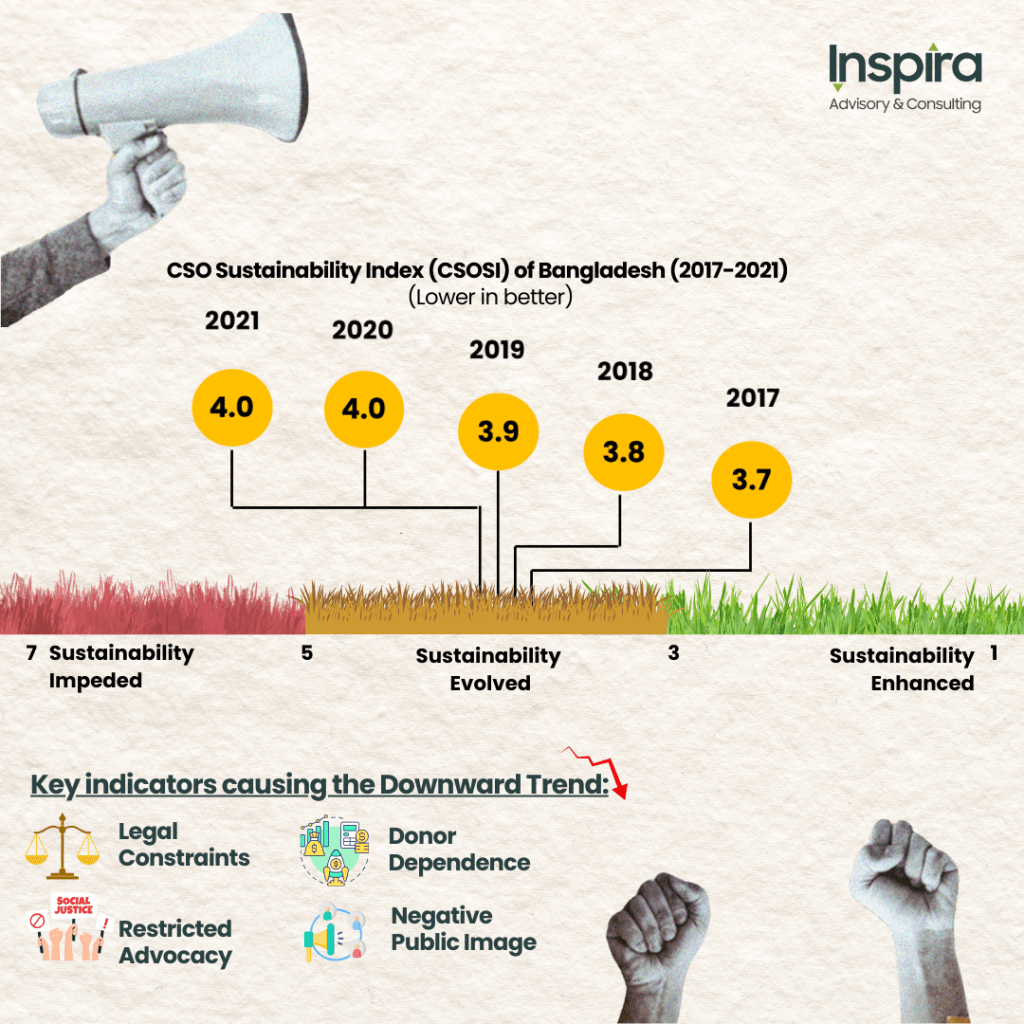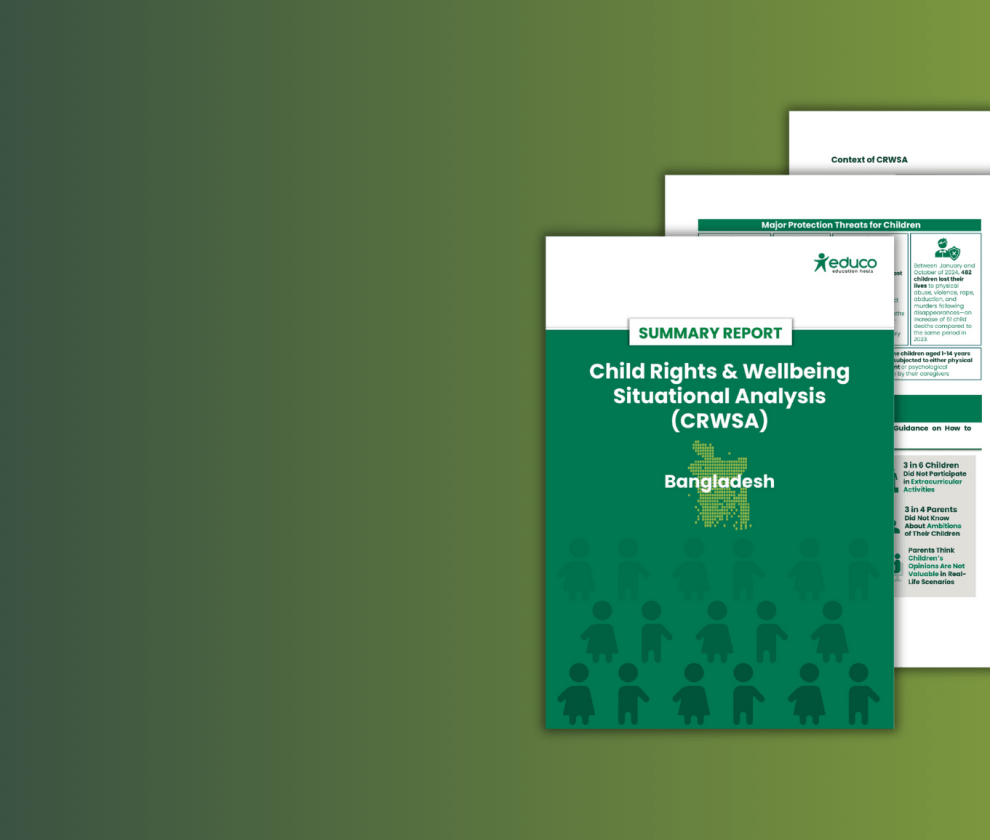Civil society organizations (CSOs) in Bangladesh, rooted in a rich tradition of philanthropy, play a crucial role in advocating social change. Around 58,000 CSOs have registered within the Department of Social Services (DSS) alone. Whereas, the exact number of total CSOs remains unknown. Despite such a hefty number, CSOs, particularly those focused on democracy, good governance, and human rights, faced repression in Bangladesh. This is evident according to ratings indicated in the CSO Sustainability Index by (CSOSI) USAID in 2021. However, with the interim government currently working to reform the country, can the challenges of the CSO sector be addressed?
What is the CSOSI?
The Civil Society Organization Sustainability Index (CSOSI) is a powerful tool that annually assesses the strength and viability of civil society organizations (CSOs). The assessment is conducted across 73 countries including Bangladesh. Funded by the U.S. Agency for International Development (USAID) for over 25 years, the CSOSI goes beyond evaluating individual CSOs. The CSOSI provides a comprehensive snapshot of the entire CSO sector. Think of it as a health checkup for civil society, the pulse of democracy, human rights, and social progress.
The CSOSI scores each country on a scale of 1 to 7 under seven critical dimensions. This provides a clear understanding of the respective country’s CSO sector’s status:
- Legal Environment: How friendly are the laws governing CSOs? Do they facilitate growth or create roadblocks?
- Organizational Capacity: Can CSOs effectively manage their operations, programs, and resources?
- Financial Viability: Are CSOs financially resilient, or do they teeter on the edge of dependence?
- Advocacy: How well do CSOs influence policies and advocate for change?
- Service Provision: Do CSOs deliver tangible services to communities, bridging gaps left by other institutions?
- Sectoral Infrastructure: Is there a supportive ecosystem—networks, collaborations, and platforms—for CSOs to thrive?
- Public Image: Are CSOs trusted and respected, or do they battle skepticism?
Key challenges Bangladesh is facing in the CSO sector’s sustainability?
According to the 2021 CSOSI for Bangladesh, the country scored 4.0. It has risen by 0.3 points on average since 2017 and remained static at 4.0 since 2020. However, upon closer inspection, the CSO sector in Bangladesh has been facing increasing challenges in a few particular critical dimensions.

- Legal and Regulatory Constraints (Score 5.1): The legal environment for CSOs deteriorated as they faced increased delays and bureaucratic harassment. This especially occurs in registration and renewal processes with the NGO Affairs Bureau of Bangladesh. The Foreign Donations (Voluntary Activities) Regulation Act (FDRA) and various circulars from the government imposed additional restrictions on CSOs. This has made it difficult for them to access foreign funding and operate effectively. This has been particularly challenging for organizations working on sensitive issues like democracy, governance, and human rights
- Financial Viability (Score 4.6): The financial sustainability of CSOs suffered due to a significant reduction in foreign funding and limited local support. Many foreign donors shifted their focus to emergency needs and the Rohingya crisis, reducing funding for other essential services such as health, education, and human rights. Additionally, delays in the release of approved foreign funds and the withdrawal of key strategic partnerships, such as FCDO’s exit from BRAC, exacerbated financial challenges
- Self-Censorship and Reduced Advocacy (Score 4.0): CSOs became more cautious in engaging in advocacy that might challenge the government. This rise in self-censorship was driven by the increasing use of the Cyber Security Act formerly known as the Digital Security Act (DSA), which was used to arrest and prosecute government critics and journalists. The resulting atmosphere of fear prevented many CSOs from addressing critical issues related to governance, rights, and accountability
- Negative Public Perception and Media Coverage (Score 4.1): The public image of CSOs deteriorated in 2021, with an increase in negative media coverage. CSOs were criticized for failing to meet the growing need for essential services during the pandemic and for forcibly collecting microcredit installments despite financial hardships caused by COVID-19. Human rights organizations also faced criticism for not taking stronger stances against government violations.
Conclusion
With the new interim government in place, they can play a role in enhancing CSO sustainability by simplifying registration, revising restrictive laws like the Foreign Donations Act, and Cyber Security Act, facilitating collaboration with the private sector for CSR funds, and easing foreign funding processes. Promoting domestic fundraising and fostering collaboration between CSOs and the government in policymaking, especially in human rights, will strengthen advocacy. Improving public perception through balanced media coverage and awareness campaigns can restore trust in CSOs. Additionally, investing in capacity-building and encouraging partnerships will boost operational efficiency. These steps will create an enabling environment for CSOs to effectively contribute to Bangladesh’s development and democratic governance.
Sources:
CSO Sustainability Index 2021 Report
USAID CSOSI Explorer
The Business Standard 2022
Dhaka Tribune 2023




